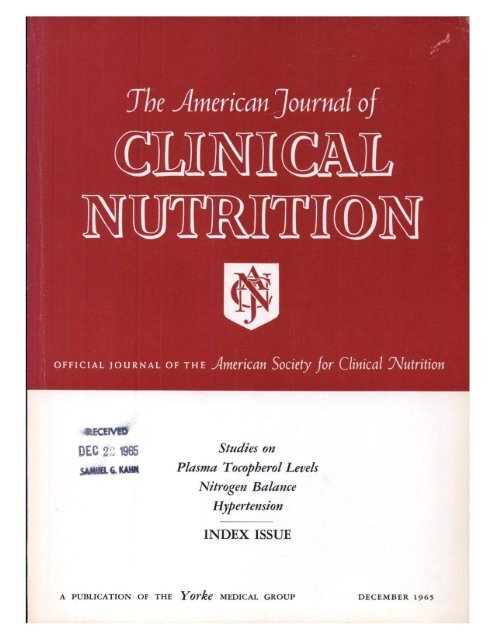更健康的饮食更可持续吗?8项饮食质量指标和7项可持续性指标的横断面评估。
IF 6.5
1区 医学
Q1 NUTRITION & DIETETICS
引用次数: 0
摘要
背景:尚未对常用的饮食质量指数(dqi)及其与多个可持续性指标的关联进行比较,这限制了政策行动。目的:在美国一个具有全国代表性的样本中,评估8个dqi和7个可持续性指标之间的关系。设计:在本横断面分析中,将来自国家健康与营养检查调查(2011-2018年,n=18,522≥20 y)的饮食数据与来自多个公开数据库的温室气体排放、累积能源需求、水资源短缺足迹、土地、肥料养分、农药和食品价格数据合并。饮食质量采用健康饮食指数-2020 (HEI-2020)、替代健康饮食指数-2010 (aHEI)、地中海饮食评分(Med)、替代地中海饮食评分(aMed)、健康植物性饮食指数(hPDI)、美国行星健康饮食指数(PHDI)、阻止高血压的饮食方法(DASH)和营养丰富的食物指数9.3 (NRF9.3)进行测量。采用线性回归法评价各膳食质量指标与可持续性指标之间的关系。结果:大部分或全部dqi得分越高,人均每日温室气体排放量(β= -0.908至-0.250二氧化碳当量,每增加1单位饮食质量z-score),累积能量需求(β= -2.699至0.202 MJ),土地(β= -0.002)越低。结论:所有dqi都有可持续性权衡,但那些强调植物性食品而不是营养素或动物性食品的dqi与更有利的可持续性结果相关。本文章由计算机程序翻译,如有差异,请以英文原文为准。
Are healthier diets more sustainable? A cross-sectional assessment of 8 diet quality indexes and 7 sustainability metrics
Background
A comparison of commonly used diet quality indexes (DQIs) and their association with multiple indicators of sustainability has not been performed, which limits policy action.
Objectives
To evaluate the associations between 8 DQIs and 7 sustainability indicators in a nationally representative sample in the United States.
Methods
In this cross-sectional analysis, dietary data from the National Health and Nutrition Examination Survey (2011–2018, n = 18,522 ≥20 y) were merged with data on greenhouse gas emissions (GHGE), cumulative energy demand (CED), water scarcity footprint (WSF), land, fertilizer nutrients, pesticides, and food prices from multiple publicly available databases. Diet quality was measured using the Healthy Eating Index-2020 (HEI-2020), Alternate Healthy Eating Index-2010 (aHEI-2010), Mediterranean Diet Score (Med), Alternate Mediterranean Diet Score (aMed), Healthful Plant-Based Diet Index (hPDI), Planetary Health Diet Index (PHDI) for the United States, Dietary Approaches to Stop Hypertension Index (DASH), and Nutrient-Rich Foods Index 9.3 (NRF9.3). The relationship between each DQI and sustainability indicator was assessed using linear regression.
Results
Greater scores on most or all DQIs were associated with lower daily per capita GHGE (β = −0.908 to −0.250 carbon dioxide equivalents per 1 unit increment in diet quality z-score), CED (β = −2.699 to 0.202 MJ), land (β = −0.002 to <−0.001 ha), and fertilizer nutrients (β= −0.026 to 0.007 kg). By contrast, greater scores on most or all DQIs were associated with greater WSF (β = 343–649 L equivalents) and diet cost (β = 0.037–1.125 US$), and had mixed associations with pesticide use (β = −0.001 to <−0.001 kg). Greater scores on aHEI-2010 and hPDI were associated with the greatest ratio of favorable-to-unfavorable sustainability outcomes (5:2 each), followed by PHDI (4:1), Med and aMed (4:2 each), HEI-2020 and DASH (3:2 each), and NRF9.3 (3:4).
Conclusions
All DQIs had sustainability trade-offs, but those that emphasized plant-based foods, rather than nutrients or animal-based foods, were associated with more favorable sustainability outcomes.
求助全文
通过发布文献求助,成功后即可免费获取论文全文。
去求助
来源期刊
CiteScore
12.40
自引率
4.20%
发文量
332
审稿时长
38 days
期刊介绍:
American Journal of Clinical Nutrition is recognized as the most highly rated peer-reviewed, primary research journal in nutrition and dietetics.It focuses on publishing the latest research on various topics in nutrition, including but not limited to obesity, vitamins and minerals, nutrition and disease, and energy metabolism.
Purpose:
The purpose of AJCN is to:
Publish original research studies relevant to human and clinical nutrition.
Consider well-controlled clinical studies describing scientific mechanisms, efficacy, and safety of dietary interventions in the context of disease prevention or health benefits.
Encourage public health and epidemiologic studies relevant to human nutrition.
Promote innovative investigations of nutritional questions employing epigenetic, genomic, proteomic, and metabolomic approaches.
Include solicited editorials, book reviews, solicited or unsolicited review articles, invited controversy position papers, and letters to the Editor related to prior AJCN articles.
Peer Review Process:
All submitted material with scientific content undergoes peer review by the Editors or their designees before acceptance for publication.

 求助内容:
求助内容: 应助结果提醒方式:
应助结果提醒方式:


